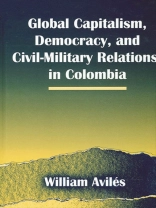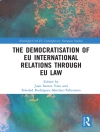Through the lens of global capitalism theory, William Avilés examines democratization and civil-military relations in Colombia to explain how social and international forces led to the ostensibly contradictory outcome of democratic and economic reform coinciding with political repression. Focusing on the administrations in power from 1990 to the present, Avilés argues that the reduction in the institutional powers of the military within the state reflected changes in the structure of the global economy, the emergence of globalizing technocrats and politicians, and shifts in U.S. foreign policy strategies toward ‘democracy promotion.’ These same factors explain Colombia’s establishment of a low-intensity democracy—a structure of elite rule in which the strategies of coercion (state and para-state repression) and consensus (competitive elections, civilian control over the military) maintain control and legitimacy. In the age of capitalist globalization, a low-intensity democracy is most concomitant with neoliberalism, establishing the political and economic environment most suitable to the investments of transnational corporations.
Table of Content
List of Tables and Figures
Acknowledgments
Introduction
1. Globalization, State Theory, and Civil-Military Relations
2. Counterinsurgency, Civil-Military Relations, and Low-Intensity Democracy: A Historical Context
3. Civil-Military Relations and the Reform of Low-Intensity Democracy
4. The Preservation of Civilian Authority in the Samper Administration
5. Military Impunity and Symbolic Reform
6. Parastate Repression and Civilian Tolerance
7. The Continuation of Low-Intensity Democracy: The Pastrana and Uribe Administrations
Conclusion
Notes
References
Index
About the author
William Avilés is Assistant Professor of Political Science at the University of Nebraska at Kearney.












